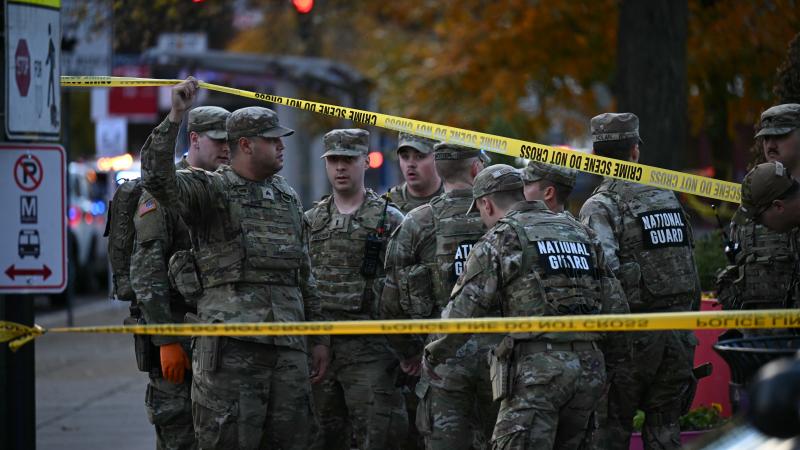Jewish target, BLM suspect in Louisville assassination attempt: Media evading potential hate motive?
Media, government, advocacy groups ignoring antisemitism, activists warn.
The attempted assassination of a mayoral candidate in Louisville, Ky., this week has shed new light on concern among some Jewish leaders that too many voices with large platforms are ignoring, downplaying and obfuscating antisemitism in America.
Craig Greenberg, a Democratic hopeful in Louisville's mayoral race, was in his campaign office on Monday morning when a man walked in, pulled out a gun, and began shooting at him, according to local police and Greenberg himself.
There were five people in the room at the time. No one was hit, but a bullet grazed Greenberg's sweater. Police say he was the target.
"When we greeted him, he pulled out a gun, aimed directly at me, and began shooting," Greenberg said at a news conference. "The individual closest to the door managed to bravely get the door closed, which we barricaded and the shooter fled the scene."
Minutes later, Quintez Brown, 21, was arrested for the shooting a half-mile from the scene and appeared in court on Tuesday. He pleaded not guilty to a charge of attempted murder and four counts of wanton endangerment. Attempted murder is a felony punishable by 10 to 20 years in prison.
Brown has been active in Black Lives Matter (BLM) and launched a campaign for a seat on the Louisville Metro Council.
Police have not yet identified a motive for the shooting, but one motivation being considered is antisemitism.
"Mr. Greenberg is Jewish, so there's that," Louisville Metro Police Chief Erika Shields told reporters. "We don't know if it's tied to the candidates or is political or if we are dealing with someone with mental issues or is venomous. We are looking at this from all angles."
Last week, Brown, who is African American, appeared to push his followers on social media to join the Lion of Judah Armed Forces, a group that espouses antisemitic ideology similar to that of the Black Hebrew Israelite movement, which believes blacks, not Jews, are the true descendants of the biblical Hebrews.
Followers of the Black Hebrew Israelite movement murdered four Jews at a kosher market in Jersey City, N.J., in December 2019 and planned further attacks against the Jewish community before they were killed by police, according to authorities.
Brown's recent social media posts indicate a growing interest in black nationalist and pan-Africanist leaders, including Stokely Carmichael, who said, "The only good Zionist is a dead Zionist." Zionists support Israel's survival as a Jewish state.
"We have one scientific and correct solution, Pan-Africanism: the total liberation and unification of Africa under scientific socialism," Brown wrote on his Twitter profile.
Several mainstream media outlets reported on Monday's shooting and its aftermath, but hardly any noted anywhere that Greenberg was Jewish and Brown supported — and may have tried to join — an antisemitic black nationalist militant group, according to a Just the News review of the press coverage. The few that did buried those facts at the bottom of the story.
However, several outlets were quick to point to mental illness as a possible reason for the shooting. Attorney Rob Eggert, who was retained by Brown's father and stepmother, said Tuesday that Brown is mentally ill and needs treatment, not prison.
"This is not a hate crime — it is a mental health case," Eggert said after the arraignment.
Brown mysteriously went missing for 11 days last summer, leading to questions by those close to him about his mental and emotional state.
"I don't know if Quintez Brown is antisemitic, or if that motivated this particular attack," said Zach Schapira, founder and president of the J'accuse Coalition for Justice, an organization dedicated to combating antisemitism. "I don't know if Quintez Brown suffers from a mental illness. But I do know we have at least as much evidence to attribute the shooting to hatred as we do to mental health. And yet, the media almost unanimously reported on his alleged mental instability, while downplaying or completely obfuscating the possible connection to antisemitism. Why is it that?"
Mort Klein, president of the Zionist Organization of America, argued the potential for a hate crime should serve as a main focus of inquiry into Brown's motive.
"When you have a person with [Brown's] background shooting at a white, Jewish politician, you have to question whether the motive was either antisemitic or anti-white," Klein said. "That really has not been explored. That should be the lead in any story."
"If someone was a member of the Ku Klux Klan and shot at a black political candidate," Klein continued, "everyone would immediately say this is racism."
Klein noted Brown is an activist for BLM, which he described as an "antisemitic, anti-Israel group." BLM leaders frequently condemn Israel and falsely blame the Jewish state for training U.S. police to kill black Americans.
Monday's shooting came just one month after a gunman took hostages at a Texas synagogue. The FBI initially said the hostage taker "was singularly focused on one issue, and it was not specifically related to the Jewish community."
Malik Faisal Akram, who was killed in a shootout at the synagogue, had reportedly been focused on the release of convicted terrorist Aafia Siddiqui — also known as "Lady al Qaeda" — who was sentenced to 86 years in prison for the attempted murder of two U.S. officers in Afghanistan. She blamed Israel for her conviction.
Following predictable backlash, the FBI later called the hostage situation a "terrorism-related matter, in which the Jewish community was targeted."
Some critics have said Jews face a double standard when it comes to hate crimes, citing various instances when politicians, journalists, and others were quick to condemn acts of bigotry against other groups but not Jews.
Last year, for example, elected officials and other prominent figures immediately condemned a wave of attacks against Asian Americans and Pacific Islanders. Congress passed a bill to address hate crimes against that specific community, and President Biden signed it into law.
The same week the bill was signed, several attacks against Jews erupted across the country. It took the White House over a week to issue a statement.
Meanwhile, numerous writers qualified their condemnations of antisemitism while lawmakers said the public should also focus on Islamophobia, not just anti-Jewish crimes.
Jews are the most frequent victims of hate crimes on a per capita basis and the most targeted minority group in America, according to FBI statistics.
Congress didn't pass a measure condemning antisemitism specifically after the Pittsburgh synagogue attack in 2018, when 11 Jews were killed while in prayer. Such a measure was proposed the following March, after Rep. Ilhan Omar (D-Minn.) came under fire for a series of comments that critics called antisemitic. However, progressives in Congress opposed the language, leading Democratic leadership to change it to be a statement against all forms of hate.
"Why are people so quick to explain away violence against Jews, but jump to shout 'hate crime' when other minorities are the target of violence?" asked Schapira.
Beyond the media and policy makers, the Anti-Defamation League (ADL) has also come under fire for focusing on antisemitism only in certain situations.
"The ADL is covering up the real problem when it comes to violence against Jews," said Klein, who argued the ADL only calls out anti-Jewish violence by white supremacists, while going easy on minority perpetrators of such attacks. "The ADL has really let the Jewish community down and has not fulfilled its mission of protecting the Jewish community ... My issue is fighting those who attack Jews and Israel. I don't care if they're white or black or any other color."
When asked whether it had any comment on Monday's attack in Louisville and whether it's looking into the incident to determine if it was motivated by antisemitism, the ADL pointed Just the News to a tweet from its Cleveland office, which serves Kentucky.
"We are in touch with our local community partners and law enforcement," the tweet read. "Our thoughts are with Mr. Greenberg and his family and friends as we continue to monitor the situation."
















